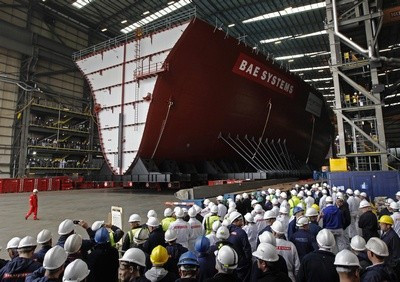Political Row as Portsmouth Shipyard 'Sacrificed' in Scottish Independence Campaign

Plans to shut down shipbuilding at England's historic Portsmouth yard, with the loss of up to 1,000 jobs, have sparked a major political row amid claims the city has been sacrificed in the campaign to stop Scottish independence.
The Govan yard on the Clyde has been spared in the long-expected defence cuts, although Glasgow will lose up to 800 jobs, but with an implied threat that if independence goes ahead, the decision could be reversed because the government would not want to place warship orders "outside the UK".
But that means a savage blow to Portsmouth which local Liberal Democrat MP Mike Hancock branded a "national disgrace", claiming the city was paying a heavy price for a piece of cynical political manoeuvring.
"Obviously there was a commercial side to the decision. But the political side of it was that it had to play into the Scottish referendum and Alex Salmond (SNP Leader and Scottish First Minister) was in a no lose situation.
"If they had closed the yard he would be saying Scotland was being punished, if they kept it open he would say they were being bribed," he said.
And Portsmouth council leader, Gerald Vernon-Jackson, said it was clearly a political decision because, "the government makes the orders and they have the money".
The prime minister, however, has insisted the decision was in "the national interest" because of the need for cuts.
BAE systems announced a review of its future 18 months ago to take into account the completion of two aircraft carriers. But as details of the proposals began to leak out, the decision was rushed forward by 24 hours and it emerged Portsmouth was to bear the brunt with 1,000 job losses and the end of shipbuilding.
Ministers insisted the decision had been a purely commercial one, but the BBC reported that a well placed source had confirmed the government was "acutely conscious of the politics of the Clyde" ahead of next year's referendum on Scottish independence.
And, announcing the decision in the Commons, Defence Secretary Philip Hammond said no order for 13 new frigates would be madde untilthe end of next year, which will be after the referendum vote is known.
But suggestions the decision could be reversed if Scotland votes for independence were dismissed by both MPs and local politicians who said it was hugely difficult to build up a new workforce once so many had been sacked.
And whatever minister say about the decision being a purely commercial one - and it is likely a Labour government could have made the same decision - claims that there was no political element to it will simply not be accepted.
All parties have a great deal of personal and political capital riding on the independence referendum with both Labour and the Tories leading the "no" campaign.
At the moment, polling suggests the vote will go their way, but it is far from a done deal and events such as this could play a pivotal role in influencing voters.
A decision to shut Govan would have handed a major coup to the pro-independence campaign led by Salmond, a highly-skilled politician who would have made the greatest possible capital out of the decision with claims Westminster had abandoned Scotland and could not be trusted to look after its best interests.
Even now, he will be able to take political advantage from the implied threat that the decision to spare Govan could be reversed if Scotland votes yes to independence.
The decision is also extremely damaging, if not unexpected, for the government which is attempting to make the most out of a string of recent good economic statistics.
This announcement has cast a dark cloud over that and will dog ministers right through to the independence referendum and even the general election in 2015.
© Copyright IBTimes 2025. All rights reserved.





















